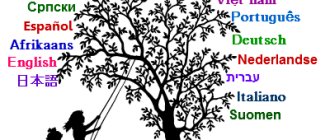This Russian-Japanese phrasebook with pronunciation and transcription includes common words and expressions for everyday communication: standard phrases of greetings, thanks, questions, requests, a set of words for communication in shops, restaurants, hotels, orientation in a new and unfamiliar place and much more.
Typically, English is used for communication in the tourism industry. At the same time, knowing and using common polite phrases that the Japanese phrasebook offers will help establish contact and earn the respect of the local population.
In the Russian-Japanese phrasebook for tourists, pronunciation is given based on transcription. The colon indicates the longitude of the sound. For convenience, you can download the Russian-Japanese phrasebook for free in pdf format.
Greetings
| Good morning | O-hayo: gozaimas |
| Good afternoon | Konnichiwa |
| Good evening | Konbanwa |
| Hello how are you doing? | Konnichiwa, do: des-ka? |
| How are you doing? | Go-kigen ikaga des-ka? |
| How are you? | De anata-wa ikaga des-ka? |
| OK, thank you | Arigato, genki des |
| How are you? | Before: des-ka? |
| Still | Aikawarazu des |
| So-so | Ma: ma des |
| Hello! | I:! |
| Welcome! | Yo: askew! |
| Glad to see you | O-aisite ureshii |
| See you! | Jya: mata |
| Goodbye | Sayo: nara |
| Good night | O yasmi nasai |
| Till tomorrow | Mata Ashita |
| Best wishes | Dewa o-daiji-ni |
| take care of yourself | Deva o-karada-o taisetsu-ni |
| I have to go | Oitoma simas |
Standard phrases
| Thank you very much | Do: mo arigato: gozaimas |
| Thank you | Taihen arigato: gozaimas |
| My pleasure | Before: itashimashite |
| Do not mention it | O-rei niwa oyobimasen |
| Nothing, don't worry | Nandemo arimasen |
| Thanks for the service | Go-kuro: deshita sama |
| thanks for the invitation | Go-sho: tai arigato: gozaimas |
| Sorry (excuse me), please | Shitsurei (sumimasen) |
| What is your name? | Nan toyu: o-namae des-ka? |
| Tell me please | Chotto sumimasen ga |
| Please pass | O-hairi kudasai |
| Here please | Do: zo kotirae do: zo |
| Let me introduce myself, I | Jikosho: kai sasete itadakimas, watashi-wa |
| Meet me please | Do: zō o-chikazuki-ni natte kudasai |
| Glad to meet you | Hajimemashite |
| Very nice | O-mi-ni kakarete ureshii des |
| What is your first and last name? | O-namae to myo: ji-wa nan-to iimas-ka? |
| My last name is my name | Watakushi-wa sei-wa, namae-wa Mo: simas |
| Excuse me, please | Gomen nasai |
| Excuse me, please | Shitsurei des ga |
| I'm sorry | O-wabi itashimas |
| Thank you for your hospitality | Go-shinsetsu arigato |
| Thank you | Arigato (gozaimas) |
| Please! | Before: dzo |
| Do not mention it | Doitasimaste |
| Congratulations! | Omedit! |
| Thank you for everything! | Iroiro to do: mo arigato |
| Can `t you help me? | Onegai itashimas |
| Sorry to bother you | Was sumimasen desyta |
| Congratulations | Omadeto: gozaimas |
| I want to invite you to Russia | Rosia ni go-sho: tai sitai to omoimas |
| I want to invite you to a restaurant | Resutoran ni go-sho: tai sitai to omoimas |
| Come with us to... | ...ni isshoni ikimasen-ka? |
| Thank you for your help (for your cooperation) | Go-kyo: ryoku arigato: gozaimas |
| thanks for the gift | Presento arigato: gozaimas |
| I am very obliged to you | O-seva ni narimashita |
| Unfortunately I can not | Zannen nagara dekimasen |
| What is this? | Kore wa nan des-ka? |
| Why? | Naze des-ka? |
| Where? | Doko des-ka? |
| Who is this? | Kono hito wa donata des-ka? |
| My name is | Watakushi-wa-to iimas |
| I want to drink | Nodo ga kawakimashita |
| I want to sleep | Nemui des |
| I'm hungry (I'm hungry) | O-naka ga suitimas |
| Please help me | O-tetsudai o-site kudasaru yo: o-negai shimas |
| Can | Dekimas |
| I can not | Dekimasen |
| I can go with you | Anata to isshōni iku koto ga dekimas |
| I can't go with you | Anata to isshōni iku koto ga dekimasen |
| I'm very sorry, but I can't | Zannen des ga dekimasen |
| I'm busy (I don't have time) | Watashi wa isogasi |
| I need to hurry | Isoganakereba narimasen |
| I am late | Okuremas |
| I'm lost | Miti ni majotta |
| sorry for making you wait | O-matase shimashita |
| I don't understand | Wakarimasen |
| I understand | Vacarimas |
| Please come again | Do: zo mo: ichido ashita o-ide-ni natte kudasai |
| make yourself at home | O-raku-ni do: dzo |
| Sorry | Sumimasen |
| It's OK | Give jobu des |
| I | Watashi |
| You(you) | Anata |
| He | Kare |
| She | Kanojo |
| Woman | Josei |
| Man | Dunsay |
| Husband | Shujin |
| Child | Kodomo |
| Son | Musuko |
| Daughter | Musume |
| Big | Ookiy |
| Small | Chisai |
| Hot | Atsui |
| Cold | Samui |
| Hot | Atatakai |
| Cold | Tsumetai |
| Good | Ii |
| Bad | Warui |
| What? | Nan deska? |
| When? | Itsu deska? |
| For what? | Naze? |
| Who? | Dare deska? |
| You will not say | Chotto o-ukagai shitai no des ga |
| May I ask you? | Chotto o-tazune shite mo ii des-ka? |
| Listen | Moshimosi |
| Let's take a photo together | Isshoni shashin-o torimasho |
| I have to ask you | O-negai ga arimas |
| Help me please | Tetsudatte kudasai, tasukete kudasai |
| Call a translator | Tsu: yaku-o yonde kudasai |
| Do you understand Russian (English)? | Rosyago (igirisugo)-ga arimas-ka? |
| I do not understand well | Amari wakarimasen |
| Do you speak Russian? | Rosiago-o hanashimas-ka? |
| Yes, I talk a little/no, I don’t talk | Uh, sukoshi hanashimas/ie, hanashimasen |
| I do not understand you | Anata no itte iru koto ga wakarimasen |
| Please talk slowly | Mo: sukoshi yukkuri itte kudasai |
| Sorry, please repeat again | Shitsurei des ga, mo: ichi-do itte kudasai |
| I don't understand when people talk fast | Hayaku hanasareru to, watashi-wa wakarimasen |
| How would it be in Russian (English?) | Kore-wa roshiago (igirisugo)-de nan-to iimas-ka? |
| Wait a minute | Chotto matte kudasai |
| This is right | Sore-wa mattaku des |
| It is not right | Sore-wa tigaimas |
| Absolutely right | Ossyaru then: ri des |
| I was wrong (I was wrong) | Watashi-wa matigaimasita |
| Really? | Masaka n. e.? |
Some cool Japanese phrases.
If you want your speech to be as close as possible to the native language, then this minimum vocabulary is for you!
よろしくお願いします。Yoroshikuonegaishimasu Nice to meet you. One of the first introductory phrases you may have already learned. Used when making acquaintances. When meeting new friends, you can shorten it to よろしくね yoroshikune.
頑張ってくださいgambattekudasai Try your best! (do your best) When a friend needs extra support, you can simply say 頑張って. This simple word means "Good luck" or "Do your best." And for business, formal situations, the option 頑張ってください is used.
おめでとうございます omedeto:gozaimasu Congratulations! Once your friend announces to you that he has passed the exam, congratulate him by saying おめでとう or more formally おめでとうございます. If he tells you that he passed the exam without mistakes, you can express your surprise with phrases such as マジ で? madzide? Indeed? or うそ ! uso! It can't be! (or you're lying!).
すごい!sugoi Wow! Marvelous! You can answer almost anything this way, it's a very common phrase. If you speak to a Japanese person in a native language, you will most likely hear this addressed to you. Conversely, if you want to say that something is terrible and not at all cool, then say: ヤバイ!yabai. However, this is a colloquial phrase; it can be used in dialogue with friends and family, but not in a formal setting. Otherwise you will be considered rude.
Hurray, you can now say a few basic words and phrases in Japanese. The Japanese words and expressions in this collection can go on and on! Don't just stop at these words, expand your vocabulary. Using these phrases, you can chat with new friends or show others that you are sincerely interested in learning Japanese. Just by including a few of these words in your conversation, you are sure to hear 日本語が上手ですね! Nihongoga jozudesune! You speak Japanese well!
If you don’t know the Hiragana alphabet yet, you can learn it in a quick way that we talk about in this article: read the article
Railway station
| Where can I find out the train schedule? | Ressha no jikokuhyo: -wa doko desho: ka? |
| Excuse me, where is the information desk? | Sumimasen ga, annaisho-wa doko des-ka? |
| Is there a train connection to the city from here? | Koko-kara -made tetsudo: -ga tsujite imas-ka? |
| How many hours (days) does the train take to the city? | Si-made kisha-de nan-jikan-gurai (nan-niti-gurai) des-ka? |
| From which platform does the train depart? | -yuki-wa namban-ho:-mu des-ka? |
| Does this train (this electric train) stop at? | Kono ressha (densha)-wa-ni teishya-shimas-ka? |
| Does this train go to the city? | Kono kisha-wa Si-e ikimas-ka? |
| This train doesn't go any further | Kono ressha-wa Eki-yori saki-e-wa ikimasen |
| There is no direct connection there. You will have to change planes. | Asoko-e-wa chokutsu:-wa arimasen kara, norikaenakereba Narimasen |
| What time is the next train until? | Yuki no tsugi no ressha-wa nan-ji des-ka |
| Excuse me, how do I get to the train station? | Totto o-tazune-shimas ga, eki-e-wa (teishaba-e-wa) do: ittara ii desho: ka? |
| Tell me, where is the ticket office? | Kippu-uriba-wa doko des-ka? |
| Where can I buy a ticket to the city? | Shi-made-no kisha-no kippu-wa doko-de kattara ii, but desho: ka? |
| How much does the ticket cost? | Kippu-wa ikura des-ka? |
| Can I return the ticket and get my money back? | Kippu no haraimodoshi-o site itadakemas-ka? |
| Please give me the lowest seat | Sita no shindai-o kudasaru yo: ni o-negai shimas |
| What carriage is this? | Kore-wa nan-go: xia deska? |
| This place is free? | Kono seki-wa aite imas-ka? |
| No, it's busy | Iie, fusagatte imas |
| Sorry, this is my place | Shitsurei des ga, soko-wa watakushi no seki des |
| Excuse me, what station is this? | Sumimasen ga, koko-wa nani eki des-ka? |
| Will this train arrive on time? | Kono kisha-wa jikan to ori-ni tsukima-mu-ka? |
| How many minutes is this train late? | Kono kisha-wa nampun okura des-ka? |
| Where can I buy a plane ticket to? | Yuki no hiko: ki no kippu-wa doko-de kattara ii, but desho: ka? |
| How much does a plane ticket cost to? | Yuki no hiko: ki no kippu-wa o-ikura des-ka? |
| How many hours is the flight to? | -made nanjikan kakarimas-ka? |
| Where is ticket registration done? | Kippu no chiekku-wa doko-de yatte imas-ka? |
| How much hand luggage can I take with me? | Tenimotsu-wa donogurai keiko:-dekimas-ka? |
| How many kilograms of luggage are you allowed to carry for free? | Ju: ryo:-seigen-wa nan-kiro-made des-ka? |
| Luggage weight exceeds the norm | Nimotsu-no ju: ryo:-ga seigen-o: ba:-site imas |
| Will the plane take off exactly on schedule? | Hiko: ki-wa yotei-do: ri shuppatsu shima-ka? |
| Flight delayed due to bad weather | Akutenko: -no tame shuppatsu-ga okurete imas |
| The plane has just been boarded | Tadaima to: jo-kaishi-no ana-unsu-ga arimashita |
| Airport terminal/airfield | Ku: ko:-ta: minaru/hiko: jo: |
| Railway station | Eki |
| Waiting hall | Matiaishitsu |
| Port | Minato |
| Marina | Futo: |
Suffix "Kun"
" Kun " is less formal and a little more "friendly". It is also a mistake to believe that Kun is used exclusively for men. Yes, in practice, it mostly turns out this way, but it is not 100% always the case. Those. It’s fair to use “ Kun” to refer to a girl, too, if you don’t want to substitute the suffix “ Tian ,” i.e. when the diminutive form is not entirely appropriate. Kun being used for girls .
Those. If you show graphically the rank of politeness, then you can place Kun San ”, but above “ Tian ”.
And these 3 suffixes should be enough for the first couple of years of study. And then come the following suffixes.
Passport control
| Fill out the entry (exit) form | Nu: koku (shukkoku) ka: do-o kinyu: si-te kudasai |
| Show your passport | Pasupo: to-o haiken shimas |
| Please, here is my passport | Do: zō, watashi no pasupo: to des |
| I'm a tourist | Watakushi-wa kanko: des |
| I came on business | Shoyo: de kimashita |
| Customs inspection of baggage | Zeikan tenimotsu kensa |
| Please provide your customs declaration | Zeikan shinkokusho-o misete kudasai |
| I have nothing to write down in the declaration | Zeikan-ni Shinkoku Surumono-wa Arimasen |
| This is my baggage | Kore-ga watakushi no nimotsu des |
| Do you have any prohibited items? | Kinseihin-wa arimasen n. e.? |
| This suitcase and this bag are mine | Watashi-no-wa kono toranku to baggu des |
| Please open (close) your suitcase | Kono toranku-o akete (shimate) kudasai |
| These are my personal things | Sore-wa watashi-ga jibun-de tsukau mono des |
| What is your currency? | Do: yu: gaika-o-mochi des-ka? |
| Here is my claim tag | Kore-ga tenimotsu uketori bango: des |
Suffix "Senpai"
“Senpai” is someone who is “senior” in a particular area. For example, for a 1st grade high school student, the senpai will be a 2nd grade high school student, and for a 2nd grade high school student, the 1st grade student will be Kohai.
We can say that they represent both simple words and nominal suffixes, just like Sensei. Those. they can also be used with names, such as Tanaka-senpai. Or you have been working for the company for 2 years, and another person has been working for 5 years. Who do you think he is for you? Right! Senpai! And for him you are Kohai.
To avoid confusion between Senpai and Kohai, use literal translation and mnemonics. Senpai is “comrade in front”, Kohai is “comrade behind”, and in the distance stands Sensei – “born before”.
Those. We imagine a graph where you stand and in the distance stands the Sensei who was born before you, the kanji Sen just hints that they came before you. Also, ahead of you is Senpai. And Kohai is behind you, as indicated by the kanji “after”.
Orientation in the city
| Where is the hotel? | Hoteru wa doko ni arimas-ka? |
| Where is the bank located? | Ginko: wa doko ni arimas-ka? |
| How to get to the hotel? | Hoteru made wa do: ittara ii des-ka? |
| Where can I buy a phone card? | Terekhon-ka: do-o doko de utteimas-ka? |
| Where is the post office? | Yu: Binkyoku wa doko des-ka? |
| What time do we meet? | Nan-ji ni matiawasesima-ka? |
| Where shall we meet? | Doko de matiavasesimas-ka? |
| Is this a street? | Kore-wa To: ri des-ka? |
| House number Here? | Kono hen wa Banti des-ka? |
| What kind of building is this? | Kore-wa do: yu: tatemono des-ka? |
| Where I am? | Koko-wa doko des-ka? |
| I'm lost | Watashi-wa michi-ni mayota, but des ga |
| Tell me how to get to the hotel? | Chotto sumimasen ga, hoteru-e wa do: ittara ii desho: ka? |
| I need to go back to the hotel | Watashi-wa hoteru -ni kaeritai, but des ga |
| This is the next street | Sore-wa konotsugi-no to: ri des |
| How to get to the street? | To: ri-e wa do: ittara ii desho: ka? |
| Walk straight down this street | Kono to: ri-o massugu itte kudasai |
| At the intersection (at the traffic light/on the corner) turn (right/left) | Kohaten (shingo:/kado)-o (migi-e/hidari-e) magatte kudasai |
| It is far from here? | Koko kara to: and des-ka? |
| Yes, far away | Uh, then: and des |
| No, not far | Iie, then: ku arimasen |
| Can you walk there? | Aruite ikemas-ka? |
| This road? | Sono michi des n. e.? |
| You're going to the wrong place | Miti-ga tigatte imas |
| I would like to get to the station, but I don’t know the way | Eki-ni iki-tai, no des ga, michi-ga wakarimasen |
| Could you draw a plan for me? | Chotto, chizu-o kaite kudasa-imasen-ka? |
| Will you walk me to the metro station? | Chikatetsu no eki made tsure-te itte kudasaimasen-ka? |
| Is it possible to get there by metro? | Soko-e chikatetsu-de ikemas-ka? |
| Yes, you can | Uh, ikemas |
| What transport can you use to get there? | -e va donna norimono de ikemas-ka? |
| Where is the post office nearby? | Yu: Binkyoku-wa doko des-ka? |
| Where can I call from? | Denwa-o sitai, but des ga, doko-kara kakerare-mas-ka? |
Summary table of characters of the Katakana and Hiragana alphabets (with Russian transcription and Romaji)
| ア | カ | サ | タ | ナ | ハ | マ | ヤ | ラ | ワ | |
| あ | か | さ | た | な | は | ま | や | ら | わ | |
| A | CA | SA | TA | ON | HA | MA | I | RA | VA | |
| A | K.A. | S.A. | T.A. | N.A. | H.A. | M.A. | YA | R.A. | W.A. | |
| イ | キ | シ | チ | ニ | ヒ | ミ | リ | |||
| い | き | し | ち | に | ひ | み | り | |||
| AND | CI | SI | TI | NI | CI | MI | RI | |||
| I | KI | SHI | CHI | NI | HI | MI | R.I. | |||
| ウ | ク | ス | ツ | ヌ | フ | ム | ユ | ル | ||
| う | く | す | つ | ぬ | ふ | む | ゆ | る | ||
| U | KU | SU | CC | WELL | UGH | MU | YU | RU | ||
| U | KU | S.U. | TSU | NU | F.U. | M.U. | YU | RU | ||
| エ | ケ | セ | テ | ネ | ヘ | メ | レ | |||
| え | け | せ | て | ね | へ | め | れ | |||
| E | CE | SE | TE | NE | HE | ME | RE | |||
| E | KE | S.E. | T.E. | NE | HE | M.E. | RE | |||
| オ | コ | ソ | ト | ノ | ホ | モ | ヨ | ロ | ヲ | ン |
| お | こ | そ | と | の | ほ | も | よ | ろ | を | ん |
| ABOUT | KO | CO | THAT | BUT | XO | MO | Yo | RO | ABOUT | N |
| O | K.O. | SO | TO | NO | HO | M.O. | YO | R.O. | (W)O | N |
| ガ | ザ | ダ | バ | パ | ||
| が | ざ | だ | ば | ぱ | ||
| GA | DZA | YES | BA | PA | ||
| GA | ZA | D.A. | B.A. | PA | ||
| ギ | ジ | ヂ | ビ | ピ | ||
| ぎ | じ | ぢ | び | ぴ | ||
| GI | DZI | DZI | BI | PI | ||
| G.I. | JI | JI | B.I. | P.I. | ||
| グ | ズ | ヅ | ブ | プ | ||
| ぐ | ず | づ | ぶ | ぷ | ||
| GU | DZU | DZU | BOO | PU | ||
| G.U. | ZU | ZU | B.U. | P.U. | ||
| ゲ | ゼ | デ | ベ | ペ | ||
| げ | ぜ | で | べ | ぺ | ||
| GE | DZE | DE | BE | PE | ||
| G.E. | ZE | DE | BE | P.E. | ||
| ゴ | ゾ | ド | ボ | ポ | ||
| ご | ぞ | ど | ぼ | ぽ | ||
| GO | SDC | BEFORE | BO | BY | ||
| GO | ZO | DO | B.O. | P.O. | ||
| キャ | シャ | チャ | ニャ | ヒャ | ミャ | リャ |
| きゃ | しゃ | ちゃ | にゃ | ひゃ | みゃ | りゃ |
| KY | SY | TY | AE | HY | MY | RY |
| KYA | SHA | CHA | NYA | HYA | MYA | RYA |
| ギャ | ジャ | ヂャ | ビャ | ピャ | ||
| ぎゃ | じゃ | ぢゃ | びゃ | ぴゃ | ||
| GY | DZYA | DZYA | BY | PY | ||
| G.Y.A. | JA | JA | BYA | P.Y.A. | ||
| キュ | シュ | チュ | ニュ | ヒュ | ミュ | リュ |
| きゅ | しゅ | ちゅ | にゅ | ひゅ | みゅ | りゅ |
| KY | SJ | TY | Nude | HY | Manchester United | RU |
| KYU | SHU | CHU | NYU | HYU | MYU | RYU |
| ギュ | ジュ | ヂュ | ビュ | ピュ | ||
| ぎゅ | じゅ | ぢゅ | びゅ | ぴゅ | ||
| GY | JJU | JJU | BYU | PY | ||
| GYU | J.U. | J.U. | BYU | PYU | ||
| キョ | ショ | チョ | ニョ | ヒョ | ミョ | リョ |
| きょ | しょ | ちょ | にょ | ひょ | みょ | りょ |
| KYO | SIO | THOSE | NOT | HYO | MIO | RYO |
| KYO | SHO | CHO | NYO | HYO | MYO | RYO |
| ギョ | ジョ | ヂョ | ビョ | ピョ | ||
| ぎょ | じょ | ぢょ | びょ | ぴょ | ||
| GYO | JO | JO | BYO | PYO | ||
| G.Y.O. | JO | JO | BYO | PYO | ||
Notes:
1. In Japanese there are long and short vowel sounds. The length of the vowel plays a meaningful role. So, KADO means “gate”, and KA:DO means “card”. In the case of transcription using the letters of the Russian alphabet, the length of vowels is indicated by doubling the corresponding vowel (KAA), a short line above the vowel sound (KA̅) or a colon (KA:); in the case of transcription in Latin letters, the length of vowels is indicated similarly (FUU, FU:); when written in katakana alphabet, vowel length is indicated by doubling the vowel or by a horizontal line in the middle of the line (サア SA:, サー SA:); When a hiragan’s alphabet is recorded, the longitude of the vowels can be indicated by doubling the corresponding vowel (お う o: こう こう こう すう すう SU :) or (in the case of vowels お, ゆ, よ) vowel う (お う こう こう, び よう, り, り, り, り,ゆう RYU:). A double vowel sound in some cases can indicate not only a long vowel, but also the presence of a syllable. For example すう (SU-U “to pass”).
2. The vowel sound U in the position between voiceless consonants, between a voiceless consonant and C, in the final syllable SU is sometimes reduced to the point of complete disappearance. So, SUKOSI is pronounced [skosi], DESU is pronounced [des], UTSUKUSIY is pronounced [utsksi:]; The vowel sound I is reduced in the position between voiceless consonants, between a voiceless consonant and C. For example, ASITA is pronounced [asta], SITSUMON is pronounced [ssumon].
The reduction of vowels い and う is indicated by a short horizontal line above the vowel sound (Ī, Ū) or in Russian transcription И, Ў. The vowel い in a position after another vowel is in many cases pronounced [y], and is designated as Y in Russian transcription.
3. In a number of Japanese words there are double consonants. To convey them, the subscript TsU is used, which is not readable, but doubles the consonant sound that follows it. For example, 才デッサ (ODESSA), はっぴょう (HAPPYO:).
4. The consonant N in the position before M, B, P is read as [m]. In this regard, a word, for example ランパ, in Russian transcription will be written: RAMPA.
5. When writing in the katakana alphabet, in addition to TsU, any sign from the following can be used as a subscript: A, I, E, O. In this case, the syllable followed by a subscript loses its vowel sound, which is replaced by a subscript. For example: ツァ CA, ティ TI, フェ FE, フォ FO. Similar cases can often be observed when writing words borrowed into Japanese from other languages.
6. In the case when, in a word, syllables consisting of the vowels A, I, U, E, O, Ya, Yu, E come after the syllable represented by the consonant N, in Russian transcription it is customary to use the dividing solid sign Ъ to show , that there are, for example, the syllables N and I, and not the syllable NI. Without taking this into account, you will not find the corresponding word, for example, in the “Big Japanese-Russian Dictionary”, ed. N.I. Conrad. Thus, the word SINAI-NARU with the meaning “beloved, dear” in this dictionary should be looked for in the form SINAI-NARU after the word SHINTSU:RIKI, and not after the word SINAI. When transcribing in Latin letters, an apostrophe is sometimes used in such cases.
7. As part of the Japanese sentence, there are so-called “case indicators”. Some of them are designated in a special way: BA (は), E (へ). The signs を and ヲ are used only to denote the case indicator O. To denote the syllable O within a word, the signs お and オ are used.
8. Regarding the stress in words, we note that the force stress that occurs in the Russian language is uncharacteristic of the Japanese language. In this regard, without going into details ( at this stage , in more detail in the following lessons), it is recommended to pronounce words with equal stress on all syllables.
9. Auxiliary signs: “゛” “ nigori ”, indicates the voicing of the corresponding consonant sound. For example が(ガ) GA. "゜" " hannigori ", indicates the semi-voicing of the corresponding consonant sound. For example ぴ(ピ) PI. “ゝ” is a repeat character of the alphabet character. For example, まゝ is equivalent to まま, and 力ゝ is equivalent to 力力. “ゞ” is a repetition sign of an alphabet character with voicing. For example, かゞ is equivalent to かが.
10. Along with the usual period and comma (. ,), Japanese texts may contain their Japanese analogues (。、).
11. To move to the next line, a Japanese word can be interrupted at any place (i.e. on any syllable). The carry sign is not placed in this case. Even the period at the end of a sentence can be moved to the next line.
How to correctly pronounce borrowings from Japanese in Russian
So, first of all, you need to keep in mind that the Latin notation of Japanese words is not English. This is one of the options for transcribing the sounds of Japanese speech, in this case in letters of the Latin alphabet, and in accordance with it there is a transcription in characters of the Russian alphabet. In it, the syllables SHA, SHI, SHU, SHO, SNA, CHI, CHU, SNO correspond to the syllables SYA, SI (and not SHI!), SYU, SIO, TYA, TI (and not CHI!), TYU, TE (and not WHAT!). The syllables JA, JI, JU, JO correspond to the syllables DZYA, DZI, DZYU, DZO. The syllable YO corresponds to E (not YO!), the vowel sound E (Latin) corresponds to E. And there shouldn’t be anything else in the Russian language. But it already is. The word “GEISHA” (not “GEISHA”!) has already entered the Russian language, and words such as “TOYOTA”, “TOSHIBA”, “HITACHI”, “SUSHI”, etc. have become entrenched in everyday communication.
The problem is that in Russian the combination [sh] is perceived as [Ш], the combination [ch] as [CH], and the voiced j as [ДЗ]. Accordingly, with an eye to the English language, [sha] [shu] [sho] is pronounced as [Sha], [SHU], [SHO]; [cha] [chu] [cho] pronounced as [CHA], [CHU], [CHO]; a [ja] [ji] [ju] [jo] is pronounced as [JA], [JI], [JU], [JO]. As a result, Japanese words written in Latin letters, proper names in particular, undergo incredible changes in Russian speech, to the point of being unrecognizable. This is how the Japanese names “Toshiba”, “Hitachi” appear in Russian, and this is how “sushi” appeared. Such pronunciation is sometimes overlaid with arbitrary stress, which in the Japanese language is very specific, in any case having little in common with the force stress in the Russian language. As a result, the name sounds like [TASHYBA] with stress on the second syllable (unstressed O in the Russian tradition is pronounced as [A]), which is unlikely to be adequately perceived by the Japanese interlocutor.
You could say this. If the legislators regarding the norms of linguistic communication were, in terms of the problems under consideration, orientalists (Japanese studies), then we would definitely say “SUSI”, “HITACHI”, “TOSIBA”, “MITSUBISHI”, “TOYOTA”, and this spelling variant would have unconditional grounds in the form of established transcription rules. But language develops according to its own laws. And our people, the native speaker and creator of the Russian language, find SUSHI closer and dearer.
The problem is not insignificant. The fact is that until recently, for many years, Japan experienced an active invasion of the Japanese language by foreign vocabulary. Now the situation is reversed. Following the spread of Japanese technology and Japanese goods throughout many countries of the world, Japaneseisms are beginning to actively penetrate into the languages of the corresponding countries (and Russia is no exception). Uniformity in the “assimilation” of Japaneseisms would be very appropriate, but, unfortunately, there is none. Although, probably, at one time in Japan, traditions of phonetic transformation of foreign language vocabulary were not immediately formed.
Since we have begun to discuss how to correctly write Japanese words in Russian, it is appropriate to say a few words about the declension of Japanese proper names. Here it is advisable to be guided by the following rule. Since the Japanese language does not know declension, it would be more correct not to change Japanese proper names, but where it is necessary to express the relationship between words in a sentence using endings, to resort to the declension of the auxiliary word, for example: “Nagoya City Municipality” (but not “Nagoya Municipality” ).
And one last thing. According to established tradition, it is customary not to indicate the length of vowels when writing proper names.
Transport
| Call a taxi | Takushi-o yonde kudasai |
| I want to go to | Ni Ikitai des |
| I need to hurry | Isoganakereba narimasen |
| I am late | Okuremas |
| What type of transport is most convenient to get to the city? | Machi-e iku niva donna ko: tsu: kikan-ga benri desho: ka? |
| When does the bus leave for the city? | Mati-e iku basu-wa itsu demas-ka? |
| How much does a bus ticket to the city cost? | Mati-made-no basu-no kip-pu-wa ikura des-ka? |
| What is the approximate cost for a taxi to the city? | Machi-made takushi: dai-wa ikura gurai kakarimas-ka? |
| Where is the taxi stand? | Takushi: but noriba-wa doko des-ka? |
| Taxi rank - in front of the airport building | Takushi: no noriba-wa ku: ko: biru no mae des |
| To me in the center | Chu: singai-made |
| Please take it to this address | Kono ju: sho-made, kudasai |
| How much do I have to pay? | Ikura des-ka |
| Boarding pass | To: deyo: ken |
| Money | O-kane |
| How many stops will there be? | -wa, ikutsu me, but teiryushjo des-ka? |
| What's the next stop? | Tsugi-wa, doko des-ka? |
| Can this bus take you to the city center? | Kono basu-va, tosin-o to: Rimas-ka? |
| Please notify me when there is a stop | Tei-re: zen-ni tsuitara o-shiete kudasai |
| How long does it take by metro (bus) from here to? | Koko kara Ma-de wa chikatetsu (basu)-de nampun gurai kakarimas-ka? |
| It's a twenty minute drive | Niju: pun gurai kakarimas |
| How much does a ticket cost to | Made no kippu-wa, ikura des-ka? |
| One ticket to | Made no kippu o itimai kudasai |
| I want to take a taxi Where is the taxi stand? | Takushi: - o hiroi tai, but des ga, noriba-wa doko des-ka? |
| Stop | Tomete kudasai |
Suffix "Senshu"
"Senshu" is not only the word for "athlete", but it is also a suffix used for famous athletes.
PS You expected that there would be more nominal suffixes here, but I thought about it and realized that there is nothing more to talk about, so if I remember something, I will definitely update the article.
Now let's talk about when suffixes are not used , because this also happens.
Suffixes do not need to be used in relation to family members when, for example, you are talking to someone.
Also, there is no particular need to use a suffix when addressing by name, because Usually in Japan this indicates a fairly close relationship to the person, so why the suffix? Those. when the relationship with a person is close enough, suffixes are not needed. On the other hand, there are so many nuances that even within the family circle they can use nominal suffixes by name.
Hotel
| Is there a hotel nearby? | Kono hen-ni hoteru-ga arimasen-ka? |
| I want to stay in a hotel near the station | Eki no chikaku-ni hoteru-o toritai, but des ga |
| What is the name of this hotel? | Sore-wa nan toyu: hoteru des-ka? |
| I would like to stay at your hotel | Kotira no hoteru ni tomete itadakitai, but des ga |
| Do you have any available rooms? | Aita heya-ga arimas-ka |
| I need a room for one | Hitorbeya-ga hoshii no desga |
| How much does a room cost per night? | Kono hoteru no heyadai-wa o-ikura des-ka? |
| Could you give us two single rooms? | Singuru hutahey o-negai dekinai desho: ka? |
| How much does a double room cost? | Futaribey-wa ikura des-ka? |
| I need a room with a bath | Basutsuki no heya ga hoshii no des ga |
| Fill out this form for visitors | Kono e: shi-ni go-kinyu: kudasai |
| What floor is our room on? | Watashitati-no heya-wa nangai des-ka? |
| This number suits me | Kono heya-de kekko: des |
| Is there a better (cheaper) room? | Motto she (yasui) heya-wa arimasyon-ka? |
| What room does he live in? | -san-wa navgohitsu desho: ka? |
| I would like to pay for a room tonight | Watashi-wa komban-no uchi-ni shiharai-o sumasetai, but des ga |
| I'll leave early tomorrow morning | Asu-wa hayaku tachimas |
| I want to leave my suitcase in the storage room until the evening | Yu: gata-made to-ranku-o tenimotsu ichiji azukarijo-ni azuketai, no des ga |
| What does this item mean in the bill? | Kanjo: - but kono komoku-wa nan des-ka? |
| This is a stay tax | Sore-wa taizaizei des |
| Can I pay in dollars? | Doru-de shiharaemas-ka? |
| I handed over the key to the maid | Ki:-wa ru: mu-me: do-ni watashimasita |
| Administrator on duty | Furonto |
| Room/room | Heya/kyakushitsu |
| Bill/tip | Kanjo/tippu |
| Key | Ki: Kagi |
Suffix "Tian"
I see errors quite often with this suffix. Most beginners and some textbooks believe that the suffix “Kun” is used in relation to boys, and “chan” is used in relation to girls. Of course this is not true. I honestly admit, I don’t know where it came from, maybe it was like this once or it’s a usage error, I don’t know what I don’t know.
However, if we talk about the Japanese language at the present time, then “ Tian ” in real life is similar to our diminutive suffix . That is, when you say, for example, Yoko- chan - you essentially say Yokochka , or to make it easier in Russian you say Masha - Mashenka . It is used in much the same way as in Russian, that is, in informal speech, and it is a gross misconception to think that “Tyan” is used exclusively for girls, although for some reason many people think so.
So, for example, you can hear when a girl calls a guy Akira- chan and this does not mean that Akira has become a girl.
This is just a diminutive of Akirochka. Or if grandfather is called “Oji-chan”, this will not make him a woman.
But there is one “BUT” : of course, a guy won’t call a guy with the suffix “chan”, because... it will really be strange, although there are such cases. Well, our two guys don’t talk in a diminutive style among themselves.
Emergencies
| I have a headache | Atama ga itai |
| I feel bad | Kibun-ga waruy, but des ga |
| I caught a cold | Kaze-o Hiita |
| I need medicine | Kusuri ga hoshii |
| Help! | Taskatee! |
| Fire! | Kaji! |
| Stop! | Tomate! |
| Dangerous | Abunai |
| Call the doctor! | Looking for oyonde kudasai |
| Call the police! | Keisatsu o yonde kudasai! |
| Call an ambulance | Kyukyusha o yonde kudasai! |
Dates and times
| Monday | Getsuyo: bi |
| Tuesday | Kayo: bi |
| Wednesday | Suiyo: bi |
| Thursday | Mokuyo: bi |
| Friday | Kinyo: bi |
| Saturday | Doyo: bi |
| Sunday | Nichiyo: bi |
| Today | Kyo |
| Tomorrow | Asita |
| Yesterday | Movie |
| Early | Hayai |
| Late | wasps |
| Soon | Sugu |
| This morning | Kesa |
| Today | Kyo: but gogo |
| Tonight | Konban |
| This year | Kotoshi |
| Next year | Ryan |
| Last year | Kyo: nen |
| At 6 o'clock in the evening | Roku-ji ni |
| At 10 am | Asa ju-ji ni |
| What time is it now? | Nadzi deska? |
| Spring | Haru |
| Winter | Fuyu |
| Summer | Natsu |
| Autumn | Aki |
| January | Ichigatsu |
| February | Nigatsu |
| March | Sangatsu |
| April | Shigatsu |
| May | Gogatsu |
| June | Rokugatsu |
| July | Shichigatsu |
| August | Hachigatsu |
| September | Kugatsu |
| October | Ju: gatsu |
| November | Zkkitigatsu |
| December | Jugnigatsu |
Purchases
| How much does it cost? | Kore wa o-ikura des-ka? |
| Can I pay by credit card? | Kureditto-ka: do de haratte mo ii des-ka? |
| Why? What for)? | Nan-no tame des-ka? |
| I want to change money | O-kane-o ryo: gae sitai des |
| How do I get to the market? | Ichiba-e-wa do: ittara ii, but desho: ka? |
| Exchange this for yen please | Kore o en ni kaete kudasai |
| How many? | Ikutsu (dono gurai) |
| I'd like to exchange these traveler's checks for cash | Kono traberazu chekku o genkin ni shieldai des |
| Where can I buy? | Wa doko de kaemaska? |
| You have? | Arimaska? |
| Show me this please | Sore o misete kudasai |
| Can I try this on? | Kite mite mo ii deska? |
| I will take it | Kore o kudasai |
| Women's clothing | Fujin fuku |
| Men's clothing | Shinshi fuku |
| Electrical goods | Kateiyo: denki kigu |
| Souvenirs | Omiyage |
| Perfumery | Ko: suirui |
| Accessories | Akusesari |
| Products | Shokuryo: hin |
| Please tell me where the shopping center (quarter) is located? | Sumimasen ga, sho: tengai-wa doko des-ka? |
| I need to buy milk and bread. Is there a grocery store nearby? | Pan to po: nu: -o kaitai, no des ga, kono hen-ni shokuryo: hinten-ga arimasen-ka |
| How much do I charge for everything? | Dzembu-de ikura-ni naru, but des-ka? |
| Where to pay? | Shiharai-wa doko des-ka? |
| Pay money to the cashier | Reji-ni o-kane-o haratte kudasai |
| Please give me a check | Tekku-o-negai simas |
| Can I try on a suit (jacket/coat/dress)? | Sebiro (uwagi/gai-to:/ doresu)-o kite mite ii deska? |
| Can I try on pants (skirt/shoes)? | Jubon (bitch: to/kutsu)-o haite mite ii des-ka? |
| I want to see the camera (video camera) | Kamera-o mitai, but des ga |
Suffix "Herself"
The suffix “Sama” has the highest position in our hierarchy.
It’s hard to translate literally, but essentially as “honorable.” It is quite rare in spoken Japanese, but it does occur. For example, this is how the service staff may address you when they ask 何名様ですか “Nan mei sama deska” - “table for how many people”? Not San, but herself. Or when you are waiting and they read you from the list, for example: 山田様はいらっしゃいますか “Yamada-sama wa irasshaimaska?” That is, we often use the nominal suffix “Sama” in the conversation of service personnel.
Just like with us, Sama can be used as a joke, this is comparable when we say “Sorry, sir” or something similar, when we deliberately raise a person’s rank as a joke.
If we are not talking about colloquial language, then “sama” is used quite often. For example, in letters to the recipient they use Sama.
Restaurant
| Waiter! | Chotto, sumimasen |
| Menu, please | Menu: kudasai |
| What would you recommend? | O susume wa nandeska? |
| How do you eat this? | Kore o do: yatte tabemaska? |
| Please (order) | Oh kudasai |
| Thank you, everything was very tasty | Gochiso: Dashita sama |
| Food | Tabemono |
| Drink | Nomimono |
| Japanese food | Vashcheku |
| Western dishes | Yo: cheek |
| Beef | Gyu: nick |
| Pork | Butaniku |
| Chicken | Toriniku |
| Fish | Sakana |
| Potato | Pote: then |
| Rice | Gohan |
| Bread | Pan |
| Salad | Sarada |
| Soup | Su: pu |
| Vegetables | Yasai |
| Fruits | Kudamono |
| Dessert | Deza: then |
| Salt | Shchio |
| Sugar | Sato |
| Pepper | Pe: pa |
| Soy sauce | Shyoyu |
| Coffee(hot) | Hotto ko: hee |
| Iced coffee) | Aisu ko: hee |
| Black tea | Ko:cha |
| Green tea | A: cha |
| Mineral water | Mineraru uo: ta |
| Cola | Co: ra |
| Juice | Ju:su |
| Milk | Gyu: nude |
| Whiskey | Whiskey |
| Vodka | Bodka |
| Red wine) | Akawain |
| Wine (white) | Schirowain |
| Rice wine | Sake |
| Beer | Bi:ru |
| Let's have lunch together | Chu: shoku-o go-isshoni ikaga des-ka? |
| Let's have breakfast together | Cho: shoku-o go-isshoni ikaga des-ka? |
| Let's have dinner together | Yu: shoku-o go-isshoni ikaga des-ka? |
| I'm hungry | Watashi-wa o-naka-ga sukimashita |
| What will you order? | Nani-ni itashimas-ka? |
| Please give me a vegetable salad | Yasai-sarada-o-negai shimas |
| Give me some soup (broth) please | Su: pu-o (consome-o) kudasai |
| Please bring chicken with potatoes (with rice) | Chikin-ni pote-to (raisu-no) Moriawase-o tsukete o-negai shimas |
| Please give me the bill | Kanjo:-o-negai shimas |
| I'd like some coffee and scrambled eggs, please. | Ko: hi: to tamago no medamayaki-o-negai shimas |
| I'll take tea with lemon and a sandwich | Watashi-wa remon-chi: to sandoitti-ni simas |
| I'll drink beer | Bi: ru-o itadakimasho: |
| Thanks, I don't drink | Do: mo arigato, watakushi-wa nomasen |
| Fork | Fo-ku |
| Spoon/teaspoon | Supu: n/cha-supu: n |
| Knife | Naifa |
| Plate | Sarah |
Dictionaries and translators
Dictionaries are available in paper and electronic formats; the latter work offline or online only. Just a few decades ago there were very few dictionary options, but in recent years the choice has become much wider.
Among the paper ones, the most famous are:
- Large Japanese-Russian dictionary (two volumes);
- Japanese-Russian scientific and technical hieroglyphic dictionary (two volumes);
- Japanese-Russian dictionary "Sanseido".
Among the electronic dictionaries that audiences love are:
- Yarksi;
- WWWJDIC;
- Nihon Moji.
Japanese translators mainly work online. Known Resources:
- yakusu.ru;
- nihongo.aikidoka.ru;
- warodai.ru.
Previously, portable electronic translators from Casio were widely used, but in recent years their popularity has waned, but the online translator from Google is conquering new heights, being able not only to translate the entered text, but also to identify characters on paper through a camera.
Which of the dictionaries and translators to use in their studies is up to the student to decide. Ordinary books are good for accuracy and reliability. They make it easier to remember the spelling of a symbol, but interaction takes time. Online dictionaries are larger, work automatically, require a minimum of time to search for a sign, and are updated regularly. There is a fly in the ointment: most programs require an Internet connection, and translations are not always accurate.
Numbers and numbers
| 0 | Zero (rei) | 20 | Niju: |
| 1 | Ichi hitotsu | 30 | San-ju: |
| 2 | No futatsu | 40 | Si-ju: (yon-ju:) |
| 3 | San mizzu(mitsu) | 50 | Go-ju: |
| 4 | Si yotsu(yotsu) | 60 | Roku-ju: |
| 5 | Go itsutsu | 70 | Shichi-ju: (nana-ju:) |
| 6 | Roku mutsu (mutsu) | 80 | Hachi-ju: |
| 7 | City nanatsu | 90 | Kyu:-ju: (ku-ju:) |
| 8 | Hachi yatsu (yatsu) | 100 | Hyaku |
| 9 | Ku (kyu:)kokonotsu | 200 | Nihyaku |
| 10 | Ju: then: | 300 | Sambyaku |
| 11 | Ju:-iti | 400 | Yonhyaku |
| 12 | Ju: no | 500 | Gohyaku |
| 13 | Ju:-san | 600 | Roppyaku |
| 14 | Ju:-si (ju:-yon) | 700 | Nanahyaku |
| 15 | Ju:-go | 800 | Happyaku |
| 16 | Ju:-roku | 900 | Kyu: hyaku |
| 17 | Ju:-city (ju:-nana) | 1000 | Sen |
| 18 | Ju:-hachi | 10000 | Hyakuman |
| 19 | Ju:-ku (ju:-kyu) | 1000000 | Itiman |
We hope that the Japanese phrasebook posted on the site will be useful during your trip to Japan - in solving household, transport and other common issues.
Numerals
| Phrase in Russian | Translation | Pronunciation |
| 0 | zero (rei) | |
| 1 | ichi hitotsu | |
| 2 | no futatsu | |
| 3 | san mizzu(mitsu) | |
| 4 | si yotsu(yotsu) | |
| 5 | go itsutsu | |
| 6 | roku mutsu(mutsu) | |
| 7 | nanatsu city | |
| 8 | hati yatsu (yatsu) | |
| 9 | ku (kyu:)kokonotsu | |
| 10 | ju: then: | |
| 11 | ju:-iti | |
| 12 | ju:-ni | |
| 13 | ju:-san | |
| 14 | ju:-si (ju:-yon) | |
| 15 | ju:-go | |
| 16 | ju:-roku | |
| 17 | ju:-city (ju:-nana) | |
| 18 | ju:-hachi | |
| 19 | ju:-ku (ju:-kyu) | |
| 20 | niju: | |
| 30 | san-ju: | |
| 40 | si-ju:(yon-ju:) | |
| 50 | go-ju: | |
| 60 | Roku-ju: | |
| 70 | Shichi-ju: (nana-ju:) | |
| 80 | Hachi-ju: | |
| 90 | kyu:-ju: (ku-ju:) | |
| 100 | hyaku | |
| 200 | nihyaku | |
| 300 | sambyaku | |
| 400 | yonhyaku | |
| 500 | gohyaku | |
| 600 | roppyaku | |
| 700 | nanahyaku | |
| 800 | happyaku | |
| 900 | kyu:hyaku | |
| 1 000 | sen | |
| 10 000 | hyakuman | |
| 1 000 000 | itiman |










